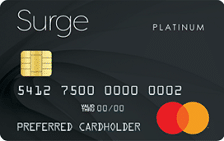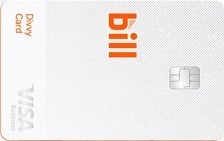Filter Options
×-
-
Unselect all
-
Unselect all
-
Unselect all

Showing 188 Cards
Sort By Column Name:
Upgrade Select Visa®
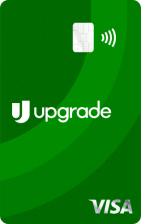
Upgrade Select Visa®
- 21.96% to 29.99% variable based on creditworthiness and the Prime Rate Regular Purchase APR
- 21.96% to 29.99% variable based on creditworthiness and the Prime Rate Balance Transfer APR
At a Glance
The Upgrade Select Visa® combines the best of the regular Upgrade Card for those looking to establish a strong credit history with unsecured credit for the first time. Cardholders enjoy up to 10% cash back on select merchants through Dosh®, and a sensible welcome bonus, all for a modest $39 annual fee.
- Best Benefits
- Rates & Fees
- Why Should You Apply?
- $200 bonus after opening a Rewards Checking Plus account and making 3 debit card transactions*
- Combine the flexibility of a card with the predictability of a personal loan
- Up to 10% cash back from your favorite brands with Upgrade Shopping
- See if you qualify in seconds with no impact to your credit score
- No touch payments with contactless technology built in
- Mobile app to access your account anytime, anywhere
- Use your card anywhere Visa is accepted
- Relax knowing that you are protected in case of unauthorized transactions with Visa’s Zero Liability Policy
- Regular Purchase APR: 21.96% to 29.99% variable based on creditworthiness and the Prime Rate
- Balance Transfer APR: 21.96% to 29.99% variable based on creditworthiness and the Prime Rate
- Balance Transfer Transaction Fee: Up to 5%
- Annual Fee: $39
- Foreign Transaction Fee: Up to 5%
- Late Payment Penalty Fee: May apply
- You struggle to pay off your credit card balances
- You want a structured repayment plan
- You can reliably pay off your statement balances and establish a strong credit history
- You have a desire to get debt-free quickly
- You hate penalty or other hidden fees
MLS Forward Credit Card
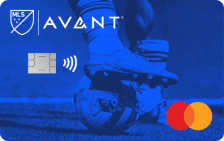
MLS Forward Credit Card
- 29.99% variable based on the Prime Rate Regular Purchase APR
- 29.99% variable based on the Prime Rate Cash Advance APR
At a Glance
The MLS Forward Credit Card powered by Avant earns MLS soccer fans everywhere up to 5X points on MLS purchases, 15% savings at the MLS shop, and more for no annual fee.
- Best Benefits
- Rates & Fees
- Why Should You Apply?
- No annual fee or foreign transaction fees
- Earn 5,000 points after spending $1,000 in purchases in the first three months
- Earn 5X points on MLSStore,com purchases
- Earn 3X points on gas, plus 2X points on dining and groceries purchases
- Earn 1X points on all other purchases
- 15% MLS Shop discount
- Regular Purchase APR: 29.99% variable based on the Prime Rate
- Cash Advance APR: 29.99% variable based on the Prime Rate
- Cash Advance Transaction Fee: Either $10 or 3% of the amount of each cash advance, whichever is greater
- Late Payment Penalty Fee: Up to $39
- You want to support your favorite MLS team
- You have average credit but don't want to pay an annual fee
- You frequently spend on gas, dining, and similar purchase categories
OneMain Financial BrightWay℠
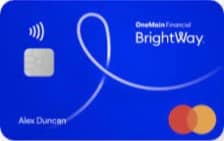
OneMain Financial BrightWay℠
- 29.74% or 30.49% variable based on the Prime Rate Regular Purchase APR
- 29.74% or 30.49% variable based on the Prime Rate Balance Transfer APR
- 29.74% or 30.49% variable based on the Prime Rate Cash Advance APR
At a Glance
The OneMain Financial BrightWay℠ credit card can help you build credit, lower your APR, and graduate to no annual fee - all from one card. The Mastercard from WebBank offers the chance of a credit limit increase or lower APR in as little as six months, but requires an invite to apply.
- Best Benefits
- Rates & Fees
- Why Should You Apply?
- Build your credit with no-time payments and graduate to the $0 annual fee Brightway+ credit card
- Lower APR or higher credit limit with 6 on-time payments
- 24/7 zero liability fraud protection
- Stay on top of your account with the Brightway mobile app
- Regular Purchase APR: 29.74% or 30.49% variable based on the Prime Rate
- Balance Transfer APR: 29.74% or 30.49% variable based on the Prime Rate
- Balance Transfer Transaction Fee: Once available, either $10 or 3% of the amount of each balance transfer, whichever is greater
- Cash Advance APR: 29.74% or 30.49% variable based on the Prime Rate
- Cash Advance Transaction Fee: Either $10 or 3% of the amount of each cash advance, whichever is greater
- Annual Fee: See Terms
- Foreign Transaction Fee: 1% of the transaction amount in U.S. dollars
- Late Payment Penalty Fee: Up to $40
- You have average credit and want to repair it with responsible use
- You don't want a confusing reward scheme
- You don’t plan on using the card to carry a balance
- You recieved a reservation code from OneMain
Current Build Card

Current Build Card
- 0.00% Regular Purchase APR
- 0.00% Cash Advance APR
At a Glance
The Current Build Card is a no annual fee secured card that builds credit while earning up to 7X points and 4% APY on savings. The card features no account minimums, no overdraft fee, and spending insights to help your build credit.
- Best Benefits
- Rates & Fees
- Why Should You Apply?
- Build credit with no minimum deposits and no annual fee
- Up to 4% APY on savings
- Earn up to 7X points on purchases with over 14,000 merchants
- No overdraft fee
- Regular Purchase APR: 0.00%
- Cash Advance APR: 0.00%
- Annual Fee: $0.00
- Foreign Transaction Fee: 3% of the transaction amount in U.S. dollars
- Late Payment Penalty Fee: 3% of any Total Due balances outstanding and past due for two or more billing cycles
- You are new to credit and want an easy way to begin building credit
- You plan on utilizing Current's spending insights to help you save money
- You don't want to pay an annual fee to earn rewards
Taz Visa®
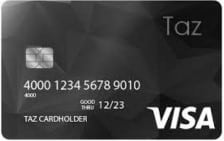
Taz Visa®
- 29.99% variable based on the Prime Rate Regular Purchase APR
- 29.99% variable based on the Prime Rate Cash Advance APR
At a Glance
The Taz Visa® is a credit builder credit card that offers a platform for responsible use but little else. The card, from First National Bank, continuously monitors for credit limit increases, giving you the tools you need to demonstrate a positive credit history and graduate to more impressive rewards cards in the future.
- Best Benefits
- Rates & Fees
- Why Should You Apply?
- Stay on top of your account with the Taz mobile app
- U.S. based customer service
- 24/7 zero liability fraud protection
- Taz regularly monitors for credit limit increases
- Regular Purchase APR: 29.99% variable based on the Prime Rate
- Cash Advance APR: 29.99% variable based on the Prime Rate
- Cash Advance Transaction Fee: 2% of the amount of each cash advance
- Annual Fee: See Terms
- Late Payment Penalty Fee: Up to $7.50
- Return Payment Penalty Fee: Up to $25
- You have bad credit and want to repair it with responsible use
- You can afford the steep annual fee
- You don’t plan on using the card to carry a balance
- You have a mail offer from Taz
You've viewed 5 of 188 credit cards
What is a Fair Credit Score?
A fair credit score is a middle-ground rating, indicating that you have a decent credit history but may still need improvement. A credit score or rating is a three-digit number that reflects your creditworthiness based on your credit history. It ranges from 300 to 850, with higher scores indicating lower credit risk. An average or fair credit score typically falls within the range of 580 to 669. While it may not be the highest score possible, it still offers opportunities for securing credit and demonstrates a moderate level of financial responsibility.
Lenders consider fair credit as an average credit risk, neither excellent nor bad. With a fair credit score, sometimes called a near-prime credit score, you can access credit products such as credit cards, auto loans, and personal loans, although you may not receive the most competitive interest rates and terms.
It’s important to note that credit scores are not static and can fluctuate based on various factors, including payment history, credit utilization, length of credit history, types of credit, and recent credit applications. By understanding the components contributing to your credit score, you can take proactive steps to improve your fair credit score and open doors to better financial opportunities.
Is Average Credit Bad?
While an average credit score isn’t the worst, it isn’t good. Lenders consider people with fair credit to be subprime. Being subprime means that when applying for a credit card, you will receive higher interest rates than those with excellent credit. They may also not have access to the best rewards, balance transfer offers (including 0% intro APR or $0 balance transfer fees), and more.
However, having fair credit isn’t necessarily bad, either. Many people with a fair credit score still have access to unsecured credit cards. Unsecured cards are what people typically think of when they imagine a credit card, unlike secured credit cards, which require a deposit, which a traditional credit card does not.
While a FICO Score between 600 and 650 is considered subprime, it isn’t uncommon. According to Experian, 17% of Americans have a fair credit score on the three largest credit bureaus. Additionally, 12% of Americans have a poor credit score. This means that a third of people with a FICO score have subprime credit. With VantageScore, the average is even higher. Using their scoring method, nearly 40% of Americans have subprime credit, with 14% having an average credit score.
The Negative Impacts Subprime Credit Score
Having average or near-prime credit can significantly impact your financial well-being, resulting in potential drawbacks like:
- Difficulty obtaining new loans or credit: Individuals with fair credit scores may encounter challenges when trying to obtain loans and credit, as lenders may perceive them as higher-risk borrowers. Lenders may offer loans with higher interest rates to individuals with lower credit scores, making borrowing more expensive.
- Limited credit options: Individuals with fair credit scores may have fewer options when choosing lenders or credit cards, as some institutions may prefer borrowers with higher credit scores.
- Housing and employment headaches: Landlords and property management companies often check credit scores when considering rental applications. A fair score might result in rejections or require larger security deposits. Additionally, some employers may check credit scores during hiring, potentially impacting job prospects for people with subprime credit.
- Higher insurance premiums: Insurance companies may use credit scores to determine auto or home insurance premiums, resulting in higher insurance costs.
- Deposits for utilities: Utility companies may require larger security deposits for services such as electricity, water, or cable for individuals with fair credit scores.
Tips for Improving Your Credit Score
If you’re in the fair credit score range, don’t fret. There are actionable steps to take to improve your creditworthiness and move towards a better score:
Pay Bills on Time
Paying your credit bills and balances on time is crucial for improving your credit score. Consider setting up automatic payments or reminders to ensure you never miss your due date. Consistently making on-time payments demonstrates financial responsibility, positively impacts your creditworthiness, and can help you repair your credit profile over time.
Reduce Credit Card Balances
High credit card balances can negatively affect your credit utilization ratio and, in turn, your credit score. Focus on paying down your credit card debt and strive to keep your balances low. By doing so, you improve your credit utilization and showcase your ability to manage credit responsibly to lenders.
Limit New Credit Applications
Each time you apply for new credit, a hard inquiry is triggered on your credit report, which can temporarily lower your credit score. Minimize the number of new credit applications you submit and instead concentrate on maintaining and responsibly managing your existing card and credit accounts.
Common Features of Near-Prime Credit Cards
Credit cards designed for average credit scores in the 600s have some common features. These features include:
| ① Annual fees | When it comes to credit cards for average or fair credit scores, expect to pay an annual fee. Fair credit scores are usually the step between secured credit and rewards cards. Outside of proprietary cards from larger banks, expect to pay an annual fee of between $24 and $75 each year. |
| ② Higher APR | People with fair credit typically pay the highest interest rates. The current average APR for someone with average credit is around 26%, while those with bad credit pay around 20%.Why do those with average credit scores pay more? The reason is that most credit cards for bad credit are secured cards. Secured cards require a security deposit, and since they are easier to get than an unsecured card, they feature fixed rates to cover the entire score range that hold them. Unsecured cards offer greater risk to lenders because there is no deposit requirement. Because of this, those with fair credit pay higher interest rates. Paying your statement balance in full each month negates this high rate, however. Plus, you’ll save money on the security deposit. |
| ③ Lower credit limits | Credit limits for average credit are lower than those for excellent credit. Individuals with excellent credit have an average new credit line of around $10,000, while those with good credit are about $6,000. Both of these credit scores are prime, or super-prime. There are no credit cards with a $10,000 limit guaranteed for fair credit. While it may be tough to get a fair credit score credit card with a high limit, improving your credit score with on-time payments, low credit utilization, and other good habits can lead to credit line increases over time. |
| ④ Rewards | While not common, there are some quality rewards credit cards for people with a fair credit score. Still, better rewards and welcome bonuses come with goodr or excellent credit. |
Conclusion
Your credit score is a powerful tool that influences your financial opportunities, and a fair credit score paves the way for progress. By understanding the nuances of credit scoring, implementing strategies to improve your score, and maintaining responsible credit habits, you can unlock the secrets of fair credit scores and set yourself up for a better financial future.
Remember, your fair credit score is not a permanent label but a reflection of your credit behavior over time. Dedication, perseverance, and the right financial practices can improve your credit score and achieve financial success.
Check out more
Near-Prime Credit Cards
Editorial Disclosure – The opinions expressed on BestCards.com's reviews, articles, and all other content on or relating to the website are solely those of the content’s author(s). These opinions do not reflect those of any card issuer or financial institution, and editorial content on our site has not been reviewed or approved by these entities unless noted otherwise. Further, BestCards.com lists credit card offers that are frequently updated with information believed to be accurate to the best of our team's knowledge. However, please review the information provided directly by the credit card issuer or related financial institution for full details.


